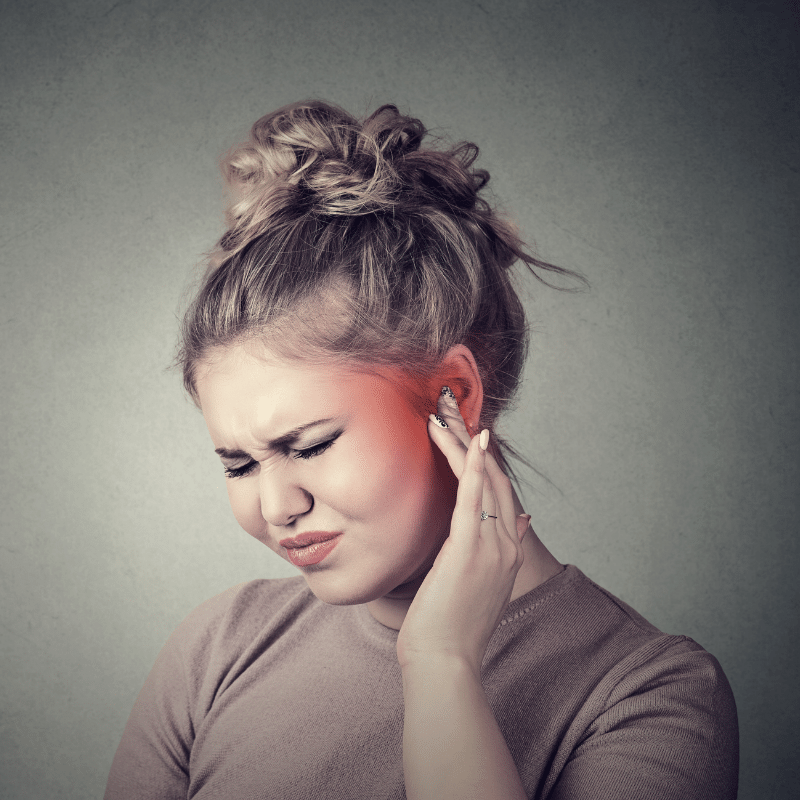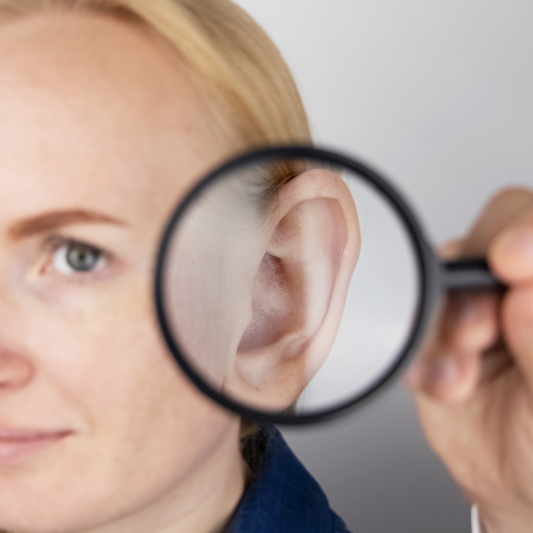
Are Hypoallergenic Earrings Good For Sensitive Ears?
Share
- What are hypoallergenic earrings?
- Why is titanium the best?
- What are the symptoms of irritation?
- How can you avoid irritation from wearing earrings?
Whether you are an occasional wearer or a true connoisseur, chances are that you’ve heard about the benefits of opting for hypoallergenic earrings a gazillion times before. In fact, if you have sensitive ears, which in most cases means that you are allergic to the metal in the many types of earring posts, a pair of titanium earrings is the ultimate choice for you. However, knowing exactly what hides behind the term “hypoallergenic earrings” will definitely come in handy when shopping for earlobe-friendly jewels.
At the end of the day, are hypoallergenic earrings good for sensitive ears? What are hypoallergenic earrings made of? Do they turn green? We made a list of the most asked questions to help you choose earrings that won’t cause pain and irritation.
Do Hypoallergenic Earrings Have Nickel In Them?
We previously mentioned that if you experience any itching or discomfort, chances are that you are allergic to the metal in the earrings’ posts. In fact, the most common metal allergy people have is to nickel and can be inherited. Surprisingly, up to 19% of the population is sensitive to it. A severe form of nickel allergy called systemic nickel allergy syndrome can cause headaches, fatigue, nausea, and many more health issues that should not be ignored.
What are symptoms of nickel sensitivity?
Symptoms typically appear within 12 to 72 hours after contact with nickel and include redness, swelling, itching, and a rash around your ear piercing area. You might also notice blisters at the contact site, and the skin may become dry, cracked, or develop crusts and scales.

If you repeatedly expose yourself to nickel, then there is a higher risk of developing an allergy at any age. You’d think that hypoallergenic earrings wouldn’t contain any traces of nickel, the widely known allergen, but that’s not the case. Hypoallergenic earrings such as stainless steel and gold may still contain 5% or more nickel, more than enough to cause irritations. Hypoallergenic literally means less likely to cause an allergy —or, a product containing a few allergy-producing substances known as allergens.
Are Hypoallergenic Earrings The Same As Nickel-Free?
Even the most expensive hypoallergenic earrings don’t always come with the benefit of being allergy-proof or free from nickel. Surgical-grade stainless steel, for example, is universally known as “hypoallergenic” however, it still contains small amounts of nickel — usually around 8%. In other cases, even what’s advertised as nickel free may still have nickel under the coating. So if the top layer gets scratched, your skill will inevitably come in constant with this heavy metal. What you really should be looking for is materials that are proven to contain no traces of nickel such as medical-grade titanium — also used in dental implants in the medical field.
Our Titanium Studs, for example, are ideal for sensitive ears and strong enough to be worn throughout the day (and night). Subtle, versatile, and chic, they are the perfect sartorial addition to pretty much every look.
What Are Hypoallergenic Earrings Made Of?
Nowadays, there are many different materials labeled as hypoallergenic. However, the most commonly used hypoallergenic earrings are made of pure metals, such as titanium and 18-24k gold. Plastic is also considered very safe for people who experience skin irritations. The only downside is that plastic earrings are too thick, which also causes irritations.
Are Hypoallergenic Earrings Good For Sensitive Skin?
Nickel-free hypoallergenic earrings are great for people with sensitive skin. If you’ve previously noticed any signs of allergy to metals and find it difficult to wear earrings in general, your best option for nickel-free, hypoallergenic materials in jewellery is titanium. It’s not only versatile and super durable but also comfortable to wear all day long. Again, just because something is labelled as “hypoallergenic”, it doesn’t necessarily mean that it’s nickel free — so make sure to do your research.

Do Hypoallergenic Earrings Turn Green?
To clarify, the green colour is due to a chemical reaction called oxidation between copper metal and things like water or chemicals. There are plenty of metals that oxidize or react with your skin. The most well-known “offender” that usually turns the skin green is copper. On the other hand, real hypoallergenic earrings made of titanium don’t turn green or cause any skin irritations.
Is Stainless Steel Or Titanium Better For Sensitive Ears?
Although, stainless steel is lauded as “hypoallergenic”, this material is made with over 100 different elements, most containing around 8% to 10.5% nickel. Titanium, on the other hand, is an elemental metal — it doesn't contain nickel. Titanium is biocompatible. This means that your skin will not react to it because titanium is mostly inert and does not react with surrounding substances. Also, when it comes to comfort, titanium is as strong as steel, but as light as aluminium. But don’t get confused! Not all titanium is equal. There are alloys of Titanium that are not medical grade. Of course, at Just-Ti Earrings, we only we test our earrings with an XRF to make sure they are the proper grade of titanium. So ultimately, titanium is better than stainless steel for sensitive ears.
Is Gold Or Titanium More Hypoallergenic?
Gold earrings are often made of a gold alloy, the most common being 18ct, with 24ct being entirely pure and much softer. In the case of 14ct and 18ct, other metals are added to gold to increase its durability. It’s well-known that alloyed metals can contain nickel. So, to put it simply, 24k Gold is hypoallergenic but anything lower than that is an alloy. Medical grade titanium is not an alloy at all (does not contain nickel) and is more hypoallergenic than alloyed gold.
However, if you love the look of gold but prefer the skin-friendly benefits of titanium, you can always opt for the Mini Gold Triangle Studs. The backs are made of titanium, whereas the front mimics the look of gold.
What may also cause irritation when wearing earrings?
If you haven't worn earrings for a while and then decide to put them in, you might notice it feels tight. This can cause irritation until your piercing stretches back to its normal size. To fix this, wear your earrings for short periods each day until the hole adjusts. This also applies if you had your ears pierced with a 20-gauge needle and then decide to wear 16- or 18-gauge earrings. We only sell 20-gauge (0.8 mm) earring posts to ensure the most comfortable fit.
Do flat back earrings cause less irritation?
The short answer? Yes, flat back earrings are often recommended for people with sensitive ears or nickel allergies, and here's why.
Traditional butterfly backs can dig into your skin, especially when you're sleeping, causing soreness and irritation. Flat backs sit flush against your ear and spread pressure more evenly, reducing the chance of skin breakdown or inflammation. Since the post passes straight through without extra creases like butterfly backs, there's less chance of trapped debris that could irritate your piercing.
The smooth flat surface is less likely to snag on hair, clothes, or masks — reducing trauma to your piercing site. Plus, flat backs don't poke into your neck when you're sleeping, unlike butterfly backs, so there's less pressure-induced redness or swelling.
They're also easier to keep clean because the design has fewer grooves where dirt, soap, or bacteria can build up. A cleaner piercing environment means fewer irritation bumps and less risk of contact dermatitis.
Many flat back earrings are made from titanium, which significantly lowers the risk of allergic reactions compared to nickel-containing alloys. Flat back earrings reduce the risk of friction or snagging and use hypoallergenic materials; this makes them more comfortable and safer for people prone to earlobe irritation.
The Best Titanium Earrings For Sensitive Ears
Now that you know all the necessary information about hypoallergenic jewelry, you are probably ready to treat yourself to some titanium earrings that are equal parts trendy and high-quality.
All our posts or hooks are made of medical-grade titanium. The earring part that is attached to the titanium post or hooks are made of alloyed metals, they do not touch your skin, and are safe to wear.

